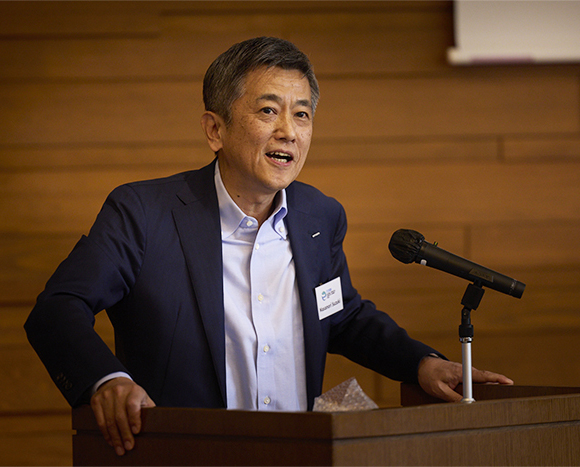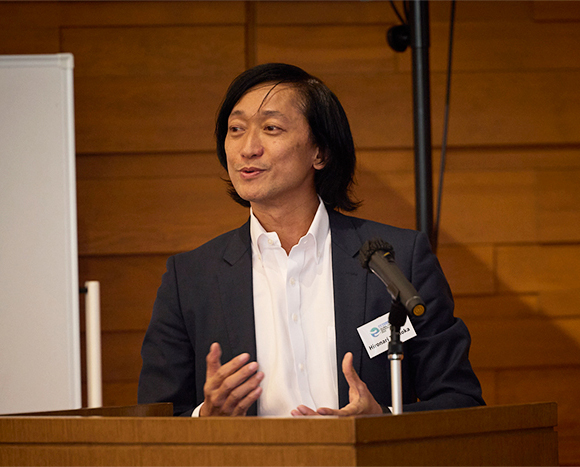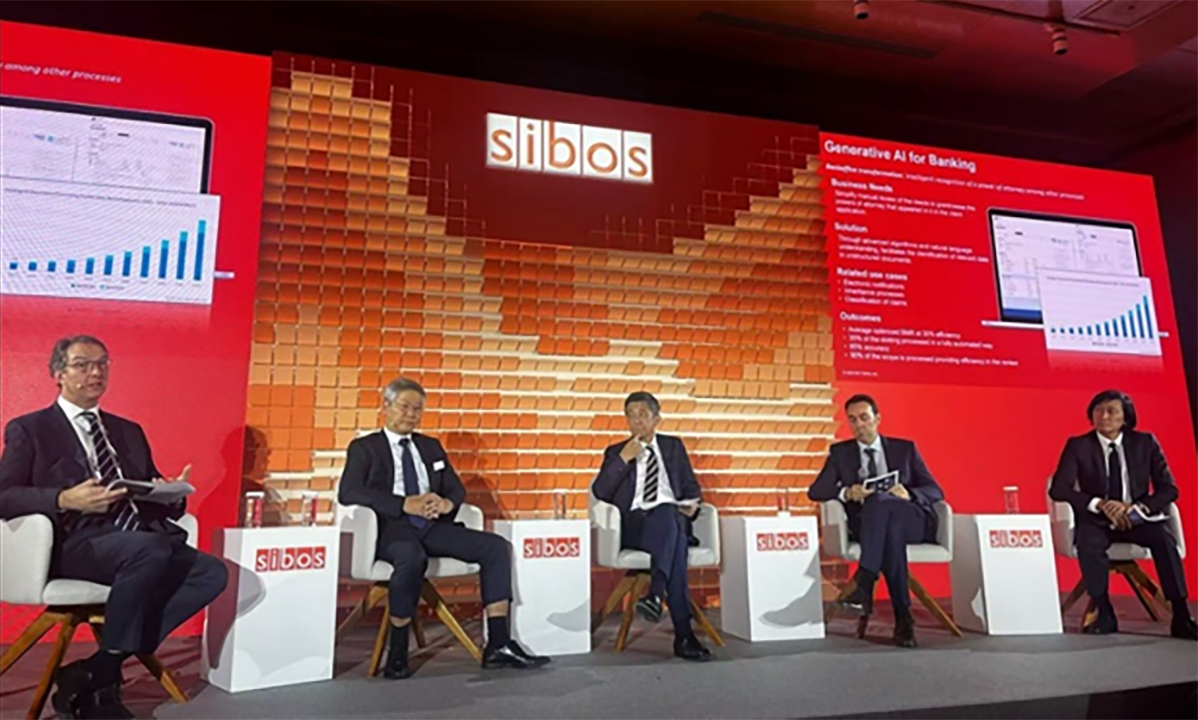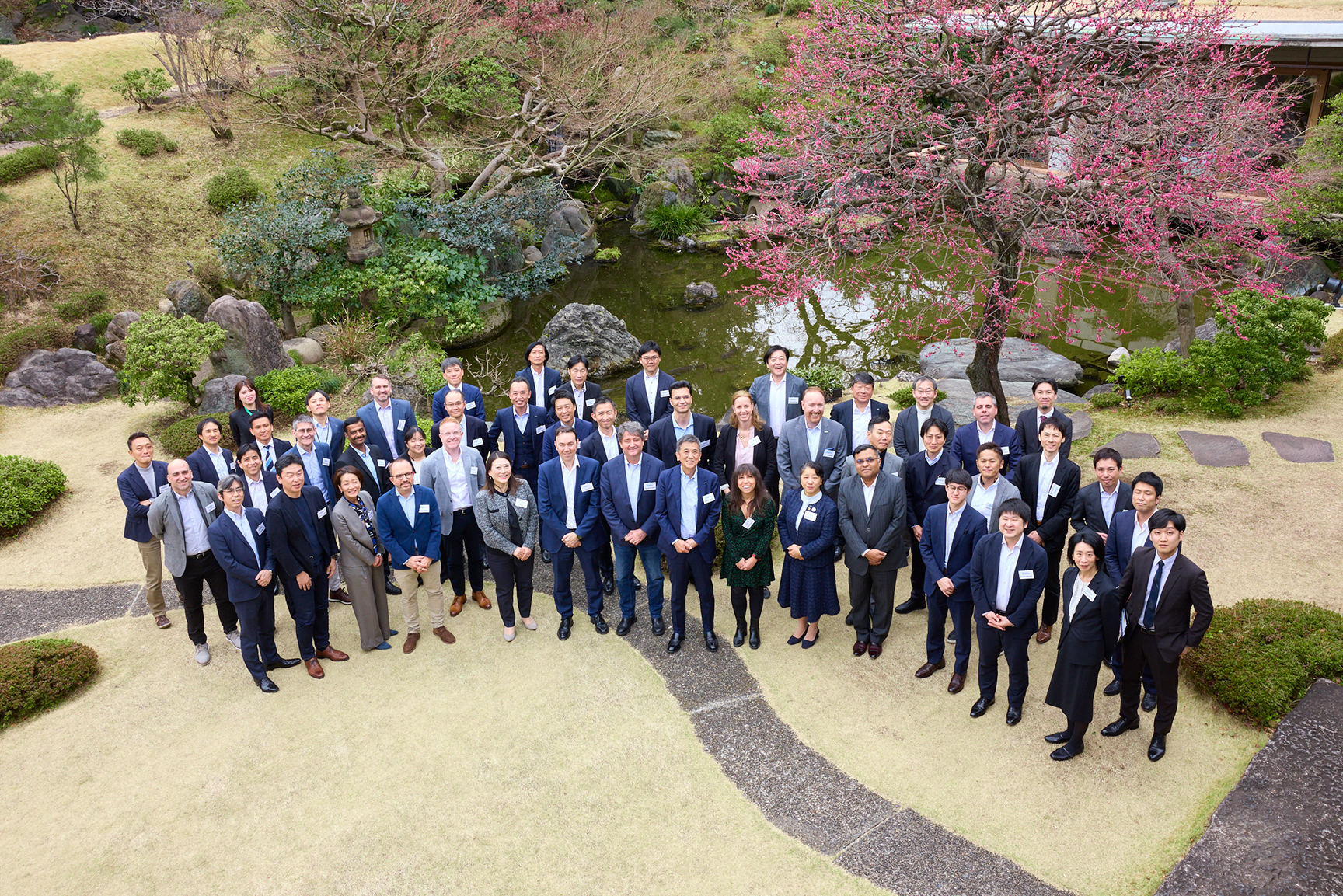Lessons from Sibos 2024
Generative AI (GenAI) has the potential to transform entire industries, and banking is no exception. However, special requirements around compliance, privacy and security mean that banking will require tailored solutions closely integrated with existing IT infrastructure. At an expert panel at the Sibos 2024 conference held in Beijing in October 2024, leading figures from NTT DATA’s global operations, along with a client executive, discussed safe and effective banking transformation in light of these requirements.
The roadmap begins with the Generative AI Office established by NTT DATA to manage strategies, policies and investments promoting GenAI within the context of strong governance.

NTT DATA Japan
“NTT DATA’s Generative AI Office will drive transformation for both NTT DATA and its clients,” said NTT DATA Japan Senior Executive VP Masanori Suzuki. “Our GenAI strategy for clients is to pursue transformation supported by three pillars: co-creation, the GenAI ecosystem and client-owned large language models (LLMs). It is essential to engage in cocreation with clients and partners to identify where GenAI can be maximized.”
NTT DATA’s Smart AI Agent™ service, launched internationally in January 2025, shows this strategy in action. Each Smart AI Agent™ acts as a kind of digital employee that complements existing workforces by autonomously executing tasks in response to user instructions. User-in-the-Loop (UITL) technology, to be released in March 2025, will create a virtuous cycle of optimization in which user feedback continuously improves agent workflows.
“In the banking industry, GenAI is already being applied to everyday employee tasks,” Suzuki said. “However, the expected proliferation of specialized services will create hurdles to adoption and limit the benefits. GenAI that collates multiple services and behaves like a coworker can address this.”

Hironori Tomioka, NTT DATA Asia Pacific’s Regional Head of App Solutions, noted the role of regional considerations in shaping approaches to GenAI. In the APAC region, for example, GenAI is seen as a technology that can empower employees to more effectively navigate the region’s formidable linguistic, cultural and legal diversity.
“Major use cases for GenAI in APAC include multilingual support, credit scoring for the unbanked and regulatory checks and report generation,” said Tomioka. “Countries such as Thailand, Malaysia and India have many languages that need support. In other countries, low literacy rates make voice-based chat quite useful.”
The challenges, Tomioka said, chiefly relate to security and accuracy. “For example, in countries where traditional banking records are lacking, alternative data from mobile phone usage and social media are sometimes used for credit scoring instead. This is sensitive data, and we must have a clear framework for handling it. Meanwhile, regulatory reports must be 100% accurate, with no ‘hallucinations.’ Our team is now establishing ways to maintain output quality.”
NTT DATA’s GenAI offerings are already making a difference in the APAC region, from AI governance consulting services to programmer empowerment through Coding by NTT DATA, an AI platform that leverages the company’s deep experience in financial systems architecture. NTT DATA’s global Innovation Hub is another way that projects around the world can access NTT DATA’s knowledge and know-how. In the APAC region, projects in India are already benefiting from this service.
“Open GenAI based on LLMs like ChatGPT will be used when the data involved is not confidential, but in clients’ private environments, closed and secure GenAI will be used for safety,” Suzuki said. “These systems will then be combined to maximize their impact.”
GenAI for private environments will need to be more lightweight than open services. NTT DATA aims to leverage its unique capabilities in this area through offerings like the small-to-medium LLM “tsuzumi” and industry-specific environments and services. For banking, Suzuki said, this might include “tailored AI models that accelerate company valuations, loan approvals and sales operations.”

Panel discussion at the Sibos 2024 conference
For example, in several countries in APAC, GenAI makes it easier to offer financial services to the unbanked, increasing levels of financial inclusion. Greater participation in economic activity across society reduces hindrances to sustainable economic development such as poverty and financial inequality. GenAI can also make possible personalized investment advice and capital management for the wealthy and for small and medium businesses, contributing to economic vitality and stability. Reinforcing real-time risk detection and anti-money-laundering efforts with GenAI helps prevent financial crimes, making financial systems safer and heightening social trust. “In order to make the most of GenAI opportunities, we need to adapt to GenAI technological changes and aim for a more prosperous and harmonious society.” Tomioka said.
Suzuki particularly emphasized GenAI’s ability to address the social issues we face today. “Japan has one of the world’s lowest birthrates and a large ageing population,” he said. “Increasing productivity in the face of a shrinking labor force is important for all industries.”
At the Hekikai Shinkin Bank, a regional shinkin bank based in Aichi Prefecture, NTT DATA’s LITRON® Generative Assistant on finposs® is already revealing the possibilities of GenAI in banking operations. Not only Hekikai Shinkin Bank, but also multiple Shinkin bank and banking association have adopted it. With GenAI's assistance, they will be able to streamline tasks such as document creation and coding, as well as ease the pressure on the region’s labor force while more efficiently supporting local firms with loan proposals, assistance with grant applications, and other services.
Regional financial institutions are at the heart of local communities. By demonstrating active use of GenAI and serving as a model in this regard, they can promote the use of generative AI by local companies. This will enable not only financial institutions but also regional communities as a whole to pursue sustainable development in the face of demographic challenges.
To achieve these goals more broadly, two things are needed: to identify areas where AI has been challenging to apply in the past - and where it can therefore have the most impact in the future - and to ensure trust so that everyone can use GenAI securely and confidently. “Simply put,” said Suzuki in closing, “we must democratize GenAI.”
NTT DATA Japan Hosts First Kin-Yu Summit to Establish Accord as “One NTT DATA” on Global Strategy in Banking, Insurance and Settlement

Seventy NTT DATA global executives and leaders gathered in Tokyo for the first Kin-Yu Summit (banking summit) on March 11 and 12, 2025. Discussion at the summit centered on aligning strategy and leveraging global capabilities to better support the Group’s clients in banking, financial services and insurance around the world.
“This summit isn’t just about exchanging information and knowledge,” said NTT DATA Japan Senior Executive Vice President and Head of Financial Segment Masanori Suzuki. “It gives us the chance to identify and discuss the challenges to global collaboration and how we can overcome them.”
The Kin-Yu Summit united Group financial leaders from every region under one roof to discuss how the Group can better address client agendas in the financial domain by leveraging its global reach, experience and technology. Amid a rapidly changing business environment, it was a pivotal opportunity to synchronize on global strategy and establish future strategic direction, and reflected the Group’s commitment to strengthening client relationships, utilizing its global capabilities and promoting digital innovation.
The summit was the first of its kind for the Group. It was proposed by Suzuki as an extension of the Tasuki Project, which was launched after the Group’s reorganization in July 2023 to share best practices globally to contribute to our clients' businesses, and cultivate human capital with a global mindset as One NTT DATA. Planning is already underway for the second Kin-Yu Summit in 2026.
NTT DATA releases latest research findings on GenAI in banking worldwide Intelligent Banking in the Age of AI: A new global survey from NTT DATA
On February 10, NTT DATA released “Intelligent Banking in the Age of AI,” a new global research survey on GenAI in the banking sector. Surveying 810 decision-makers at global banks, NTT DATA found that 58% of respondents had fully embraced GenAI. However, only half saw it as a tool for improving productivity and efficiency, with others expecting benefits such as reduced IT budgets. Clear regional trends were also visible, with full automation a goal for a third of American and Japanese banks but only a quarter of banks in Europe. Read the full report here: Intelligent Banking in the Age of AI.
“Pioneering the Future of Finance”: NTT DATA launches new “Moving forward in harmony.” campaign, targeting Japanese financial enterprises and partners
In October 2023, NTT DATA launched a new branding campaign in Japan, “Moving forward in harmony.” to enhance its brand perception as a modern, innovative IT and consulting company. In February 2025, the company launched a seven-part campaign highlighting how these ideals underpin its contribution at the cutting edge of Financial Technology. Using the message “Pioneering the Future of Finance,” the campaign includes seven individual advertisements, each highlighting a different kind of value NTT DATA contributes to financial enterprises and partners. The seven advertisements will form a panorama when placed side-by-side. Though initially targeting the Japan market, the “Moving forward in harmony.” campaign also offers a glimpse of the position as a trusted IT leader that NTT DATA is establishing globally.



